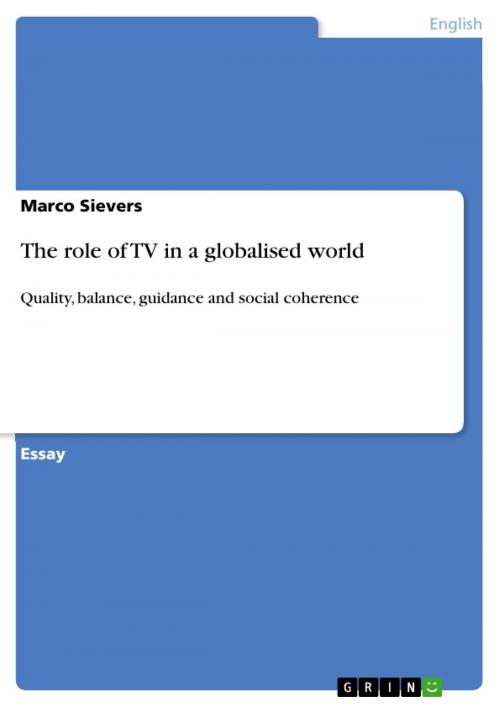The role of TV in a globalised world
Quality, balance, guidance and social coherence
Nonfiction, Reference & Language, Study Aids, ESL, Foreign Languages| Author: | Marco Sievers | ISBN: | 9783638828406 |
| Publisher: | GRIN Publishing | Publication: | July 12, 2007 |
| Imprint: | GRIN Publishing | Language: | English |
| Author: | Marco Sievers |
| ISBN: | 9783638828406 |
| Publisher: | GRIN Publishing |
| Publication: | July 12, 2007 |
| Imprint: | GRIN Publishing |
| Language: | English |
Essay from the year 2006 in the subject English Language and Literature Studies - Culture and Applied Geography, grade: 1, Liverpool John Moores University, course: English in British Television, 13 entries in the bibliography, language: English, abstract: Since the invention of television its role in society has been subject of continuous and controversial debates revolving about tasks, duties and responsibilities. The classical controversies focussed on the relationship between the state as a TV provider and its citizens, trying to weigh public interests up against individual liberties. Most of the time, they were limited to a national level and included elements of class struggle (cf. Corner 2001, 261, 263 et seq.) Manifold changes in the TV landscape altered the face of programming and had effects on the role of TV. They turned the political struggle for television into a battle for market shares with an increasing international orientation. The liberalisation of television in association with the development of new broadcasting technologies led to a multitude of competing TV stations and to a diversity of available programmes. Private broadcasters' dependence on funding by adverts caused a commercialisation of TV and shifted the focus of programming to ratings, which have become an all-dominant factor. The constant search for new ways of attracting viewers' attention favours sensational topics and resulted in a variety of new programme formats (cf. Corner 2001, 266 and Wedell & Luckham 2002, 119). Globalisation has aggravated competition by flooding national markets with international products, and by supranational media conglomerates trying to peruse their interests in short-term profit-raising. Finally, adding to the tense atmosphere, the internet challenges TV's role as a mass medium with its global scope and its nearly unlimited supply of entertainment, information and interactivity. Therefore, a modern definition of the role of television has to comprise a re-evaluation of classic issues, a consideration of technological change and globalisation, and an international perspective. Even if TV seems to lose ground as the leading mass medium, it is still of great significance as a 'central ingredient of everyday life' and as an 'indispensable factor in the organisation of polity, society and culture' (Corner, 2001, 261). On the backdrop of growing commercialisation and superficiality a recollection of tasks and duties is necessary. Executives have to be reminded that broadcasting is not solely a business, but also an enterprise connected to responsibilities and to accountability. Existing excrescences have to be curtailed by a focus on quality, balance and guidance. Additionally, TV's significance for the establishment and maintenance of social coherence should be recognized and emphasized.
Essay from the year 2006 in the subject English Language and Literature Studies - Culture and Applied Geography, grade: 1, Liverpool John Moores University, course: English in British Television, 13 entries in the bibliography, language: English, abstract: Since the invention of television its role in society has been subject of continuous and controversial debates revolving about tasks, duties and responsibilities. The classical controversies focussed on the relationship between the state as a TV provider and its citizens, trying to weigh public interests up against individual liberties. Most of the time, they were limited to a national level and included elements of class struggle (cf. Corner 2001, 261, 263 et seq.) Manifold changes in the TV landscape altered the face of programming and had effects on the role of TV. They turned the political struggle for television into a battle for market shares with an increasing international orientation. The liberalisation of television in association with the development of new broadcasting technologies led to a multitude of competing TV stations and to a diversity of available programmes. Private broadcasters' dependence on funding by adverts caused a commercialisation of TV and shifted the focus of programming to ratings, which have become an all-dominant factor. The constant search for new ways of attracting viewers' attention favours sensational topics and resulted in a variety of new programme formats (cf. Corner 2001, 266 and Wedell & Luckham 2002, 119). Globalisation has aggravated competition by flooding national markets with international products, and by supranational media conglomerates trying to peruse their interests in short-term profit-raising. Finally, adding to the tense atmosphere, the internet challenges TV's role as a mass medium with its global scope and its nearly unlimited supply of entertainment, information and interactivity. Therefore, a modern definition of the role of television has to comprise a re-evaluation of classic issues, a consideration of technological change and globalisation, and an international perspective. Even if TV seems to lose ground as the leading mass medium, it is still of great significance as a 'central ingredient of everyday life' and as an 'indispensable factor in the organisation of polity, society and culture' (Corner, 2001, 261). On the backdrop of growing commercialisation and superficiality a recollection of tasks and duties is necessary. Executives have to be reminded that broadcasting is not solely a business, but also an enterprise connected to responsibilities and to accountability. Existing excrescences have to be curtailed by a focus on quality, balance and guidance. Additionally, TV's significance for the establishment and maintenance of social coherence should be recognized and emphasized.















